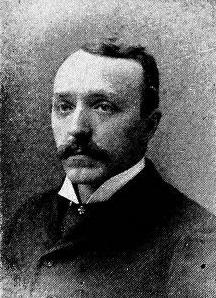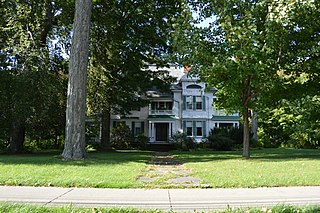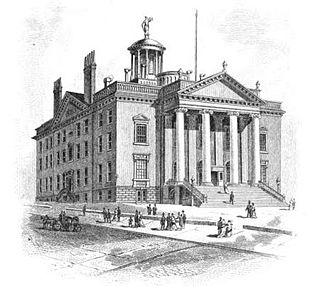
Samuel Frederick Nixon (December 8, 1860 Westfield, Chautauqua County, New York - October 10, 1905 Westfield, Chautauqua County, New York) was an American businessman and politician.

Samuel Frederick Nixon (December 8, 1860 Westfield, Chautauqua County, New York - October 10, 1905 Westfield, Chautauqua County, New York) was an American businessman and politician.
He was educated at Westfield High School and graduated from Hamilton College in 1881.
He had interests in railroad companies, and operated a marble and granite works, a box factory and various other enterprises in and around Westfield.
In 1884, he was elected Trustee of the Village of Westfield. In 1886, he was elected Supervisor of the Town of Westfield. Later he was elected Chairman of the Chautauqua County Board of Supervisors for 14 annual terms.
He was a member of the New York State Assembly (Chautauqua Co., 1st D.) in 1888, 1889, 1890.
He was again a member of the State Assembly in 1894, 1895 (both Chautauqua Co.), 1896, 1897, 1898, 1899, 1900, 1901, 1902, 1903, 1904 and 1905 (all ten Chautauqua Co., 2nd D.); and was Speaker from 1899 to 1905. He was a delegate to the Republican National Convention in 1904.
In the summer of 1905, he travelled to visit the Lewis and Clark Centennial Exposition in Portland, Oregon, but returned already ill. A few weeks later he developed "blood poisoning" and underwent two operations, but died shortly thereafter. His home, the Nixon Homestead, was listed on the National Register of Historic Places in 1983. [1]

Reuben Eaton Fenton was an American merchant and politician from New York. In the mid-19th century, he served as a U.S. Representative, a U.S. Senator, and as Governor of New York.

George Washington Patterson was an American politician in the U.S. State of New York. He served as a member of the United States House of Representatives and as the lieutenant governor of New York.

Walter Loomis Sessions was an American lawyer and politician from New York.

Francis Beattie Brewer was a physician and an American politician and a U.S. Representative from New York.
Joseph Albert McGinnies was an American businessman and politician.

Egburt E. Woodbury was an American lawyer and politician.
The Monteagle Sunday School Assembly (MSSA) is an interdenominational religious organization based in Monteagle, Tennessee. It was chartered by the state of Tennessee on October 31, 1882, with the purpose of
the advancement of science, literary attainment, Sunday School interests, and the promotion of the broadest popular culture in the interest of Christianity without regard to sect or denomination.

Reuben Gridley Wright Farm Complex is a historic home and farm complex located at Westfield in Chautauqua County, New York. The home is a two-story wood frame Queen Anne style dwelling built in 1883 for Rueben Gridley Wright, one of Westfield's most prominent citizens. The house was designed by Fredonia architect Enoch A. Curtis. The property includes five contributing farm outbuildings that relate to its operation as an extensive late 19th century vineyard operation.

The Samuel F. Nixon Homestead', or simply the Nixon Homestead, is a historic home located in the Village of Westfield in Chautauqua County, New York. The original house was built in 1856 and subsequently expanded in about 1890 to its current size and style.

Welch Factory Building No. 1 is a historic grape juice factory located at Westfield in Chautauqua County, New York. It was built in 1897 and expanded in 1899 and 1903, to be an 8-bay wide, 10-bay deep rectangular building. It is the oldest extant structure associated with the Welch's company.

Westfield station is a historic train station located at Westfield in Chautauqua County, New York. It was constructed in 1904, for the Lake Shore and Michigan Southern Railway. It is a 1+1⁄2-story brick, terra cotta, and sandstone structure in the Romanesque style. It served as the main transfer point for rail passengers destined for the Chautauqua Institution. The Jamestown, Westfield and Northwestern Railroad interurban, serving the eastern part of Chautauqua used the station. The Chautauqua Traction Company, serving the Chautauqua hamlet, used the Nickel Plate Railroad's station in Westfield.

The 1905 United States Senate election in New York was held on January 17, 1905. Incumbent Senator Chauncey Depew was re-elected to a second term in office. He was renominated unanimously after former Governor Frank S. Black dropped his challenge, and easily won the election given the Republican Party's large majorities in both houses.

The 1904–05 United States Senate elections were held on various dates in various states, coinciding with President Theodore Roosevelt's landslide election to a full term and the 1904 House of Representatives elections. As these U.S. Senate elections were prior to the ratification of the Seventeenth Amendment in 1913, senators were chosen by state legislatures. Senators were elected over a wide range of time throughout 1904 and 1905, and a seat may have been filled months late or remained vacant due to legislative deadlock. In these elections, terms were up for the senators in Class 1.

The 39th New York State Legislature, consisting of the New York State Senate and the New York State Assembly, met from January 30 to April 17, 1816, during the ninth year of Daniel D. Tompkins's governorship, in Albany.

Loren B. Sessions was an American lawyer and politician from New York. He was most notable for his service in the New York State Senate from 1878 to 1881.

The 127th New York State Legislature, consisting of the New York State Senate and the New York State Assembly, met from January 6 to April 15, 1904, during the fourth year of Benjamin B. Odell Jr.'s governorship, in Albany.

The 128th New York State Legislature, consisting of the New York State Senate and the New York State Assembly, met from January 4 to July 20, 1905, during the first year of Frank W. Higgins's governorship, in Albany.

J. Samuel Fowler was an American lawyer and politician from New York.
Arthur C. Wade was an American lawyer and politician from New York.

Elial Todd Foote was an American physician, politician, jurist and historian. He was the judge of Chautauqua County, New York, from 1824 to 1843. Previously, he had three terms in the New York State Assembly.